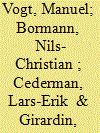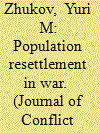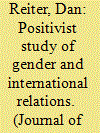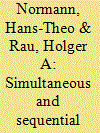|
|
|
Sort Order |
|
|
|
Items / Page
|
|
|
|
|
|
|
| Srl | Item |
| 1 |
ID:
141705


|
|
|
|
|
| Summary/Abstract |
This contribution investigates the role of education in domestic terrorism for 133 countries between 1984 and 2007. The findings point to a nontrivial effect of education on terrorism. Lower education tends to promote terrorism in a cluster of countries where socioeconomic, political, and demographic conditions are unfavorable, while higher education reduces terrorism in a cluster of countries where conditions are more favorable. This suggests that country-specific circumstances moderate the effect of education on terrorism. The results of this study imply that promoting education needs to be accompanied by sound structural change to positively affect (individual and society-wide) development and consequently reduce terrorism.
|
|
|
|
|
|
|
|
|
|
|
|
|
|
|
|
| 2 |
ID:
141710


|
|
|
|
|
| Summary/Abstract |
This article introduces the new Family of Ethnic Power Relations (EPR) data sets, version 2014, which is the latest in a series of data sets on ethnicity that have stimulated civil war research in the past decade. The EPR Family provides data on ethnic groups’ access to state power, their settlement patterns, links to rebel organizations, transborder ethnic kin relations, and intraethnic cleavages. The new 2014 version does not only extend the data set’s temporal coverage from 2009 to 2013, but it also offers several new features, such as a new measure of regional autonomy that is independent of national-level executive power and a new data set component coding intraethnic identities and cleavages. Moreover, for the first time, detailed documentation of the EPR data is provided through the EPR Atlas. This article presents these novelties in detail and compares the EPR Family 2014 to the most relevant alternative data sets on ethnicity.
|
|
|
|
|
|
|
|
|
|
|
|
|
|
|
|
| 3 |
ID:
141704


|
|
|
|
|
| Summary/Abstract |
Why do combatants intentionally uproot civilians? The forcible relocation of families and communities to concentration camps, “protected villages,” and other special settlements is a regular feature of irregular war, occurring in almost a third of all counterinsurgency campaigns since 1816. Despite the historical regularity of these practices, most research has focused on individual decisions to flee, rather than the brute-force resettlement of civilians by combatants. Using a dynamic model of popular support and new micro-level data from Soviet secret police archives, I show that civilian resettlement is not simply a by-product of war but is a rational response to informational asymmetry. Combatants who cannot identify and selectively punish their opponents face incentives to control the population rather than earn its support. For strong governments with limited coercive leverage, civilian resettlement offers a way to reduce rebel activity without having to win hearts and minds.
|
|
|
|
|
|
|
|
|
|
|
|
|
|
|
|
| 4 |
ID:
141709


|
|
|
|
|
| Summary/Abstract |
Up until about 2000, most of the work on gender and international relations (IR) was nonpositivist in nature. Since 2000, there has been a burst of positivist gender/IR scholarship, much of it quantitative. This work has addressed several important areas in IR, including terrorism, interstate war, human rights, civil war, violence against civilians, public opinion, international norms, globalization, and others. Much of this work has developed new data, advanced theory, and employed rigorous empirical methods. This article surveys this positivist scholarship. It discusses how positivist and nonpositivist gender/IR work complement each other. This article makes recommendations about directions for future scholarship on gender and IR.
|
|
|
|
|
|
|
|
|
|
|
|
|
|
|
|
| 5 |
ID:
141708


|
|
|
|
|
| Summary/Abstract |
In a step-level public-good experiment, we investigate how the order of moves (simultaneous vs. sequential) and the number of step levels (one vs. two) affects public-good provision in a two-player game. We find that the sequential order of moves significantly improves public-good provision and payoffs, even though second movers often punish first movers who give less than half of the threshold contribution. The additional second step level—which is not feasible in standard Nash equilibrium—leads to higher contributions but does not improve public-good provision and lowers payoffs. We calibrate the parameters of Fehr and Schmidt’s model of inequality aversion to make quantitative predictions. We find that actual behavior fits remarkably well with several predictions in a quantitative sense.
|
|
|
|
|
|
|
|
|
|
|
|
|
|
|
|
| 6 |
ID:
141706


|
|
|
|
|
| Summary/Abstract |
Casualty counts are often controversial, and thorough research can only go so far in resolving such debates—there will almost always be missing data, and thus, a need to draw inferences about how comprehensively violence has been recorded. This article addresses that challenge by developing an estimation strategy based on the observation that violent events are generally distributed according to power laws, a pattern that structures expectations about what event data on armed conflict would look like if those data were complete. This technique is applied to estimate the number of Native American and US casualties in the American Indian Wars between 1776 and 1890, demonstrating how scholars can use power laws to estimate conflict size, even (and perhaps especially) where previous literature has been unable to do so.
|
|
|
|
|
|
|
|
|
|
|
|
|
|
|
|
| 7 |
ID:
141707


|
|
|
|
|
| Summary/Abstract |
Most contemporary civil wars are now recurrences of earlier civil wars. In contrast to classic theories of grievance and opportunity, this article advances a theory of civil war recurrence that highlights the critical role political and legal institutions play in constraining elites in post–civil war states. Such constraints serve as a check on executive power, help incumbent elites credibly commit to political reform, and create a situation where rebels need not maintain militias as a supplementary mechanism to hold political elites in line. All of this reduces the odds of repeat civil war. Using a statistical analysis of post-conflict years, this article demonstrates that strong political institutions are not only significantly and negatively related to repeat civil war but are the primary determinants of whether countries get caught in the conflict trap.
|
|
|
|
|
|
|
|
|
|
|
|
|
|
|
|
|
|
|
|
|